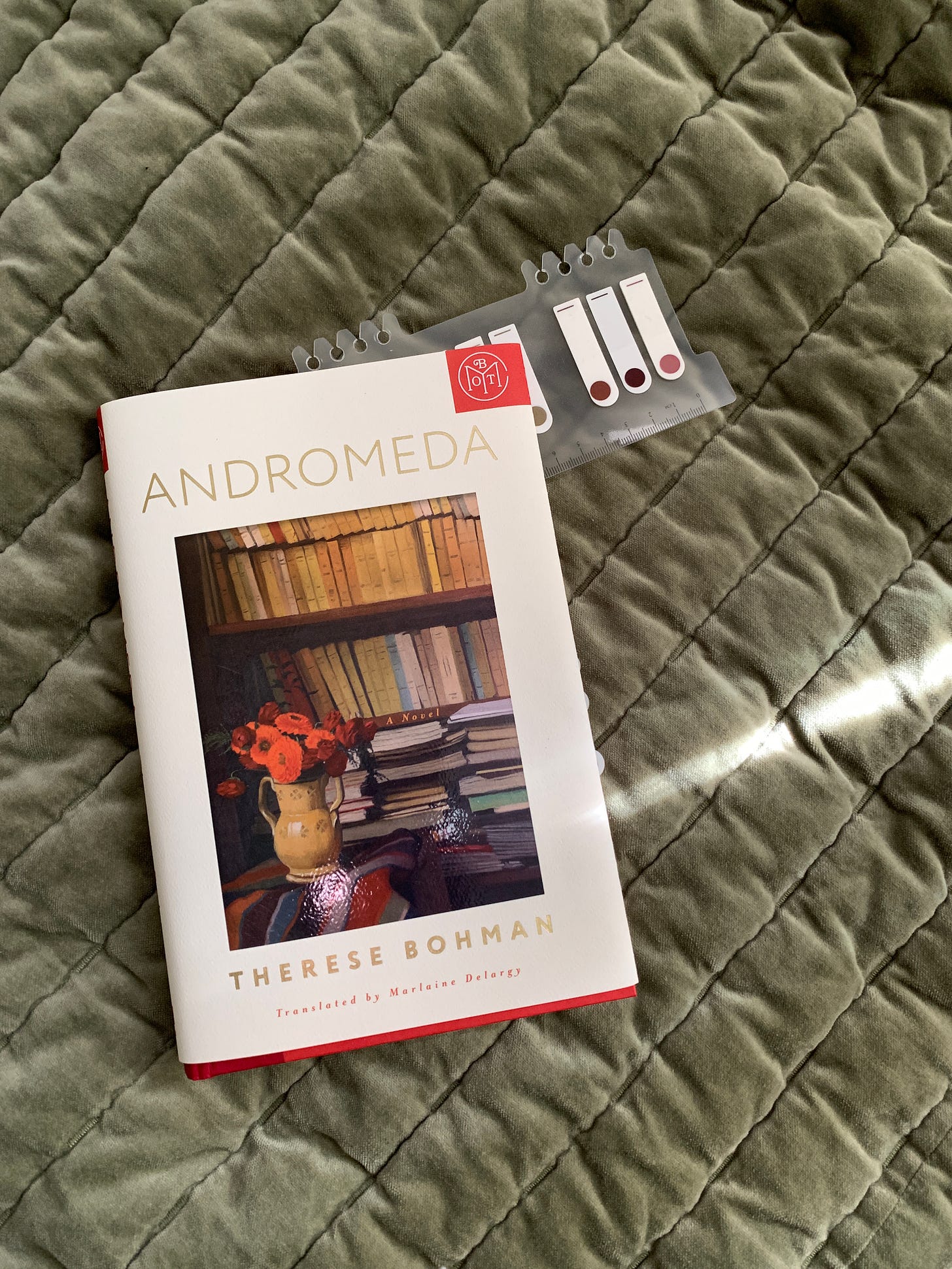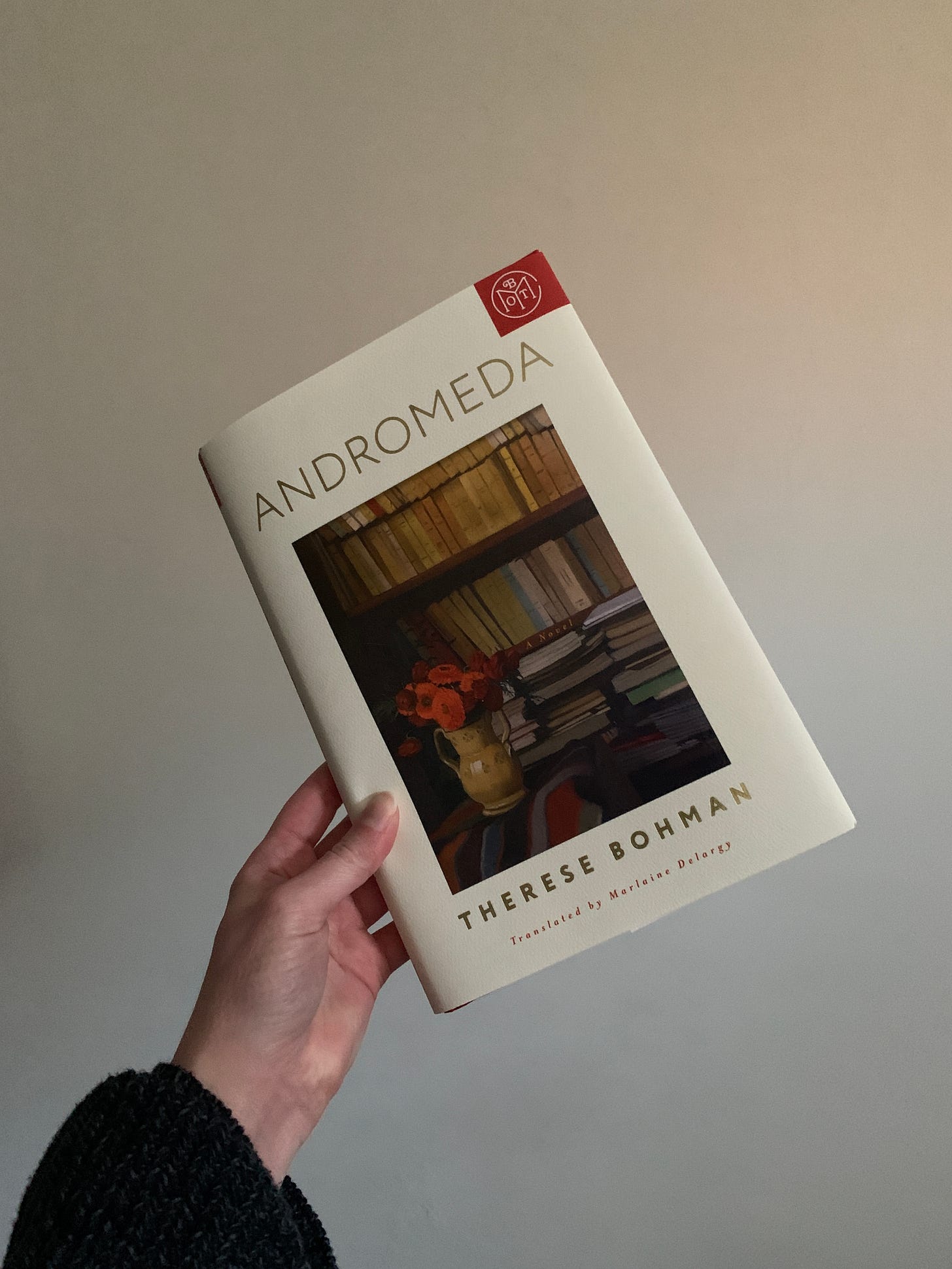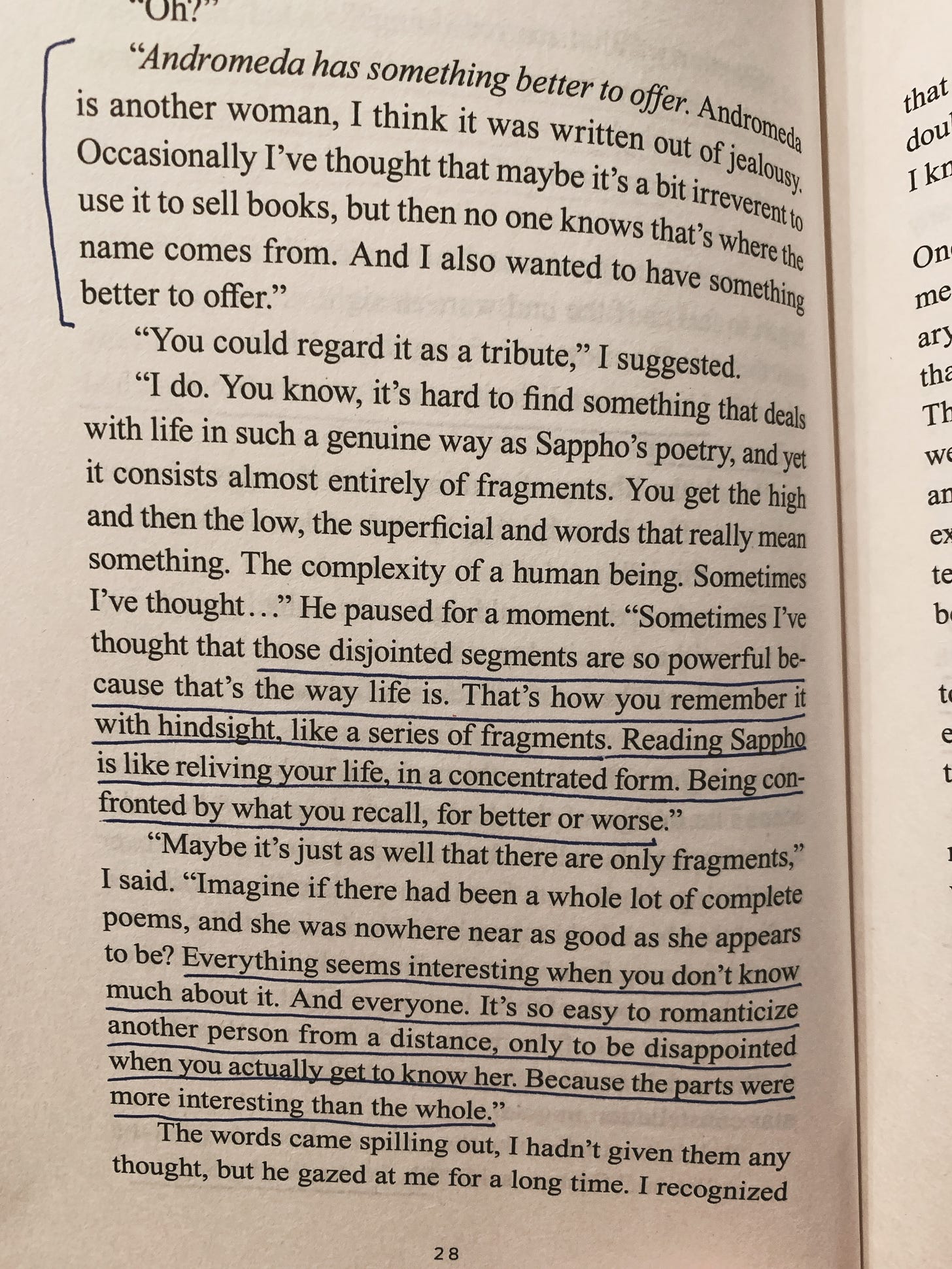Welcome to Notes, Quotes, and Reflections, aka a look inside my reading journal. This week I’m logging Andromeda by Therese Bohman.
Title: Andromeda
Author: Therese Bohman
Translator: Marlaine Delargy
Translation Published: Other Press, 2025
Read Date: January 25-30, 2025
This was a right book, right time situation…or rather, this book made me wince with deep existential sadness because its explication of “love” in the modern era (overwhelmingly defined by capitalism-induced fragmentation) hit a little too close to my core wounds and recent, uh, trifles…
No matter! This short novel was a surprise and a treat. It was my Book of the Month pick for January, and I was delighted to see a translated literary work on offer. I was particularly drawn to it because it follows two characters working at a literary imprint, and I appreciate meta commentary on the literary/publishing world. But the core of this story is something else—more universal and existential. It’s an interesting work, so I thought it was worth sharing with you today. I hope you don’t mind if these collections get a little long sometimes.
“As soon as you have conquered someone, or allowed yourself to be conquered, and gotten used to the situation, a situation without any uncertainty, a situation where everything is out in the open, then the desire to let someone further in disappears, to dig deeper within yourself for the sake of another person...” (p. 175)
Reading Notes
This book is split in half, each part narrated by 1 of the 2 main characters.
Following a woman through her publishing career at Rydens as an editor, and her relationship with Gunnar, the editor in chief. Begins when she is a student intern, but she is quickly handed an editorial role by Gunnar based on the fact she was ~so honest~ about how bad a well-liked novel was.
set in Stockholm
she must be younger than 25 when this begins, and Gunnar is what…in his 50s maybe?
Andromeda is the imprint known for publishing Sweden’s most prestigious contemporary authors
first person narration
“Andromeda has something better to offer”
Andromeda here is a reference to a Sappho fragment
piecing together fragments of our lives; romanticizing things you don’t know
“Our entire relationship was a silent protest against everything we both loathed about the contemporary era: the vulgar feminism, the tabloid rhetoric, the politicization of every aspect of our lives, the commercialization of the true and the beautiful, the narrow-minded assumption that an older man and a younger woman couldn’t possibly enjoy a mutual exchange because the balance of power was so obviously not in my favor.” (p. 40-41)
Page 41 — it seems like she is unknowingly parroting his viewpoints here. She feels so special having this attention and private time with someone so powerful (someone she has romanticized in her head—admitting that she doesn’t know much about him personally, and yet filling in the gaps with unmitigated confidence) and so takes on his opinions of the world as her own.
Quite slow. It has taken me days to read 60 pages because it just isn’t pulling me in. But I think if I can get myself to sit down and chill out for a couple of hours then I will probably finish it quickly.
well this relationship is…interesting
I’m curious what level of unreliable this narrator is. I don’t feel like her perspective is totally trustworthy, but I wonder if that’s purposeful or just…human.
Sofie — the first use of her name is on page 96
A lot of commentary around nostalgia, history, forgetting, capitalism, the “death drive” is sort of implied
Part 2 is from Gunnar’s perspective now, but I’d like to return to Sofie’s to round it out.
traditional vs modern
Interesting portrait of a man I suppose—he is quite dissatisfied with himself and the contemporary world, with the work he does that never feels quite as important as it should, and he refers often to his ancestors, generations past who did real work, and finds solace in the idea that he is part of that lineage…this is why men fall into fascism!
The depressing realization of understanding your context in history (you’re nothing and totally forgettable in the grand scheme of things)
Sappho fragments - fragments of self - fragmentary time
I don’t know how I’m meant to feel about these characters, especially Gunnar, but this is like the only kind of “love” story I understand. Broken, fragmented people who don’t actually fall in love.
for such a short book, this really leaves me sitting with a lot to think about.
This is not quite what I was expecting from this novel. I’m pleasantly surprised by it. I still feel uncertain about the narrators, but I’m fully enthralled by their perspectives. I like that the author took a different route with this dynamic, and made it feel more complex. There is no sense of relief, more so a sadness at the thought of connection never fully realized.
The characters’ deep sense of dissatisfaction makes them quite loathsome—and yet I feel the truth behind their thoughts, leaving me with a queasy ambiguity about their relationship and their general worldviews.
mirrors afraid to get too close
Naturally, this song was in my head every time I picked up this book
Further Reflection
Through the backdrop of a literary imprint and publishing house, our narrators push back against the unceasing “progress” of the contemporary world. Two editors—a 20-something woman and a 60-something man—commiserate in their dissatisfaction with the ever-dwindling quality of “literature”, the “number crunchers”, and the general turn away from meaning. Pushing back against the death drive, they believe the literature they put into the world can somehow make it better.
This novel generally contends with modernity and the narrative of progress; the tireless commercialization of art and literature; and the irreverence for what once was “good”. It questions what contemporary literature offers—what context will it carry with it through the generations? If we only publish what sells, what history will be left on the shelves 50-100 years from now?
It also spotlights the fragmentary nature of our “selves”, our lives, and our relationships in modern society. How does this socially-induced isolation impede our abilities to truly connect with each other and find love?
It is a thought-provoking novel, though it could easily be deemed “pretentious”—in the true sense of the word. But I appreciate the reflections it led me to, and I marked so many passages to save and look back on.
Quotes
“When I tried to contemplate my life from the outside, it almost came across as a cliched image of alienation in a big city—being so close to other people, yet so far away from them. I was an insignificant human being among thousands of others.” (p. 5)
“It felt as if the universe contracted around us and we were its innermost core, a bubble of unexpected intimacy and slight intoxication that was a lovely place to be.” (p. 22)
“…those disjointed segments are so powerful because that’s the way life is. That’s how you remember it with hindsight, like a series of fragments. Reading Sappho is like reliving your life, in a concentrated form. Being confronted by what you recall, for better or worse.” (p. 28)
“Everything seems interesting when you don’t know much about it. And everyone. It’s so easy to romanticize another person from a distance, only to be disappointed when you actually get to know her. Because the parts were more interesting than the whole.” (p. 28)
“How life-changing a reading experience can be, how it can fill you with a completely new perception of what life could be, fresh insights into what is worth striving for, worth believing in and defending, what it means to live life to the fullest.” (p. 36)
“My whole life had been about a constant forward motion, a belief—swinging between vague hope and strong conviction—that things would get better, or if not better, then at least they would be different, and this difference had an intrinsic value, because the idea that everything would carry on as it had originally been was too depressing.” (p. 45)
“How do you mourn a relationship like that? A relationship that had been more real than any other in my life, but had never actually existed in reality, never manifested itself in public, never been designated by a term that encapsulated its true nature.” (p. 84)
“There was something beautiful about those fleeting encounters. After a while I began to think that maybe that was who I was, that my true self was fleeting, best suited to a few hours of socializing. That was when I came into my own, when I was still new in someone else’s eyes and she was new in mine. When I was still a fragment around which you could weave a dream.” (p. 161)
“That is probably why new people are so tempting, not necessarily for their own sake but for yours. The new and the fleeting offer a chance for you yourself to become new. A chance to be seen as you want to be seen, maybe as the person you really are: a fragment that contains more truth than the whole.” (p. 175)
“It is idiotic to have someone in your life with whom everything feels so self-evident, yet not take care of that relationship in every possible way.” (p. 180)
Book Recommendations
Eros the Bittersweet by Anne Carson
Alone With You in the Ether by Olivie Blake
This is Pleasure by Mary Gaitskill
Conversations with Friend by Sally Rooney
Previously…
Cold Nights of Childhood
Welcome to Notes, Quotes, and Reflections, aka a look inside my reading journal. This week I’m logging Cold Nights of Childhood by Tezer Ozlu.
Thanks for reading today’s issue of Empty Head. Subscribe to receive future issues of Open Tabs, more bookish musings, and misc. writings in your inbox/feed. And of course, please share if you feel so inclined!








The Weyes Blood song came straight to my head when I read the title of your post! Loving this collection of impressions/reflections, and I'm really intrigued by the novel, have added to my tbr! and I'm also impressed by BOTM for offering what seems to be a fairly niche and literary translated work (what a lovely cover, too)